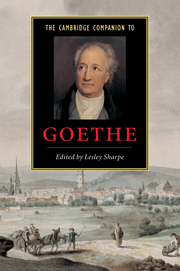Book contents
- Frontmatter
- Introduction
- 1 The world Goethe lived in
- 2 Goethe the writer and literary history
- 3 Goethe the poet
- 4 Goethe the dramatist
- 5 Faust
- 6 Weimar Classicism
- 7 Goethe and the Weimar theatre
- 8 Goethe’s prose fiction
- 9 Autobiographical writings
- 10 In defence of experience
- 11 Goethe and gender
- 12 Goethe and the visual arts
- 13 Goethe and the political world
- 14 Religion and philosophy
- 15 Reception in Germany and abroad
- A guide to further reading
- Index
6 - Weimar Classicism
Goethe’s alliance with Schiller
Published online by Cambridge University Press: 28 May 2006
- Frontmatter
- Introduction
- 1 The world Goethe lived in
- 2 Goethe the writer and literary history
- 3 Goethe the poet
- 4 Goethe the dramatist
- 5 Faust
- 6 Weimar Classicism
- 7 Goethe and the Weimar theatre
- 8 Goethe’s prose fiction
- 9 Autobiographical writings
- 10 In defence of experience
- 11 Goethe and gender
- 12 Goethe and the visual arts
- 13 Goethe and the political world
- 14 Religion and philosophy
- 15 Reception in Germany and abroad
- A guide to further reading
- Index
Summary
Goethe's relationship with Schiller is a rare phenomenon in literature, an alliance of equals that stimulates the work of both but also transcends it in a common cause. The individualism inherent in creative writing is turned, in an extraordinary act of mutual tolerance, into understanding and cooperation. Each offers the other constructive criticism and practical example, they consult and collaborate. Their aim is not just to fulfil their own potential, but to establish new standards for German literary culture. Through theory and practice, and sometimes through satire and polemic, they create what came to be known as Weimar Classicism.
The contrast with earlier classicisms – this is the last one Europe would see – is striking. The French grand siècle, the Spanish siglo de oro, the Elizabethan and Augustan ages of English literature were all prolonged developments, rooted in a stable national society, concentrated in capitals and major cities, and in each case the work of several great names. The German version was created in just one decade within the borders of a small and insignificant duchy in a politically fragmented Germany that was not yet even a nation; and it was the doing of just two writers, whose contemporaries contributed little of significance or, often, actually opposed them.
- Type
- Chapter
- Information
- The Cambridge Companion to Goethe , pp. 101 - 115Publisher: Cambridge University PressPrint publication year: 2002
- 3
- Cited by

